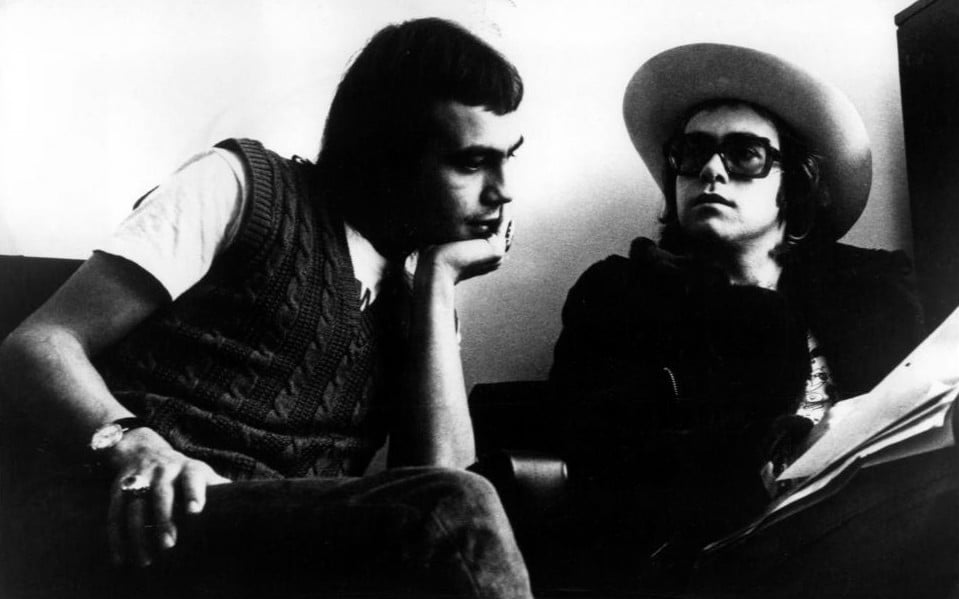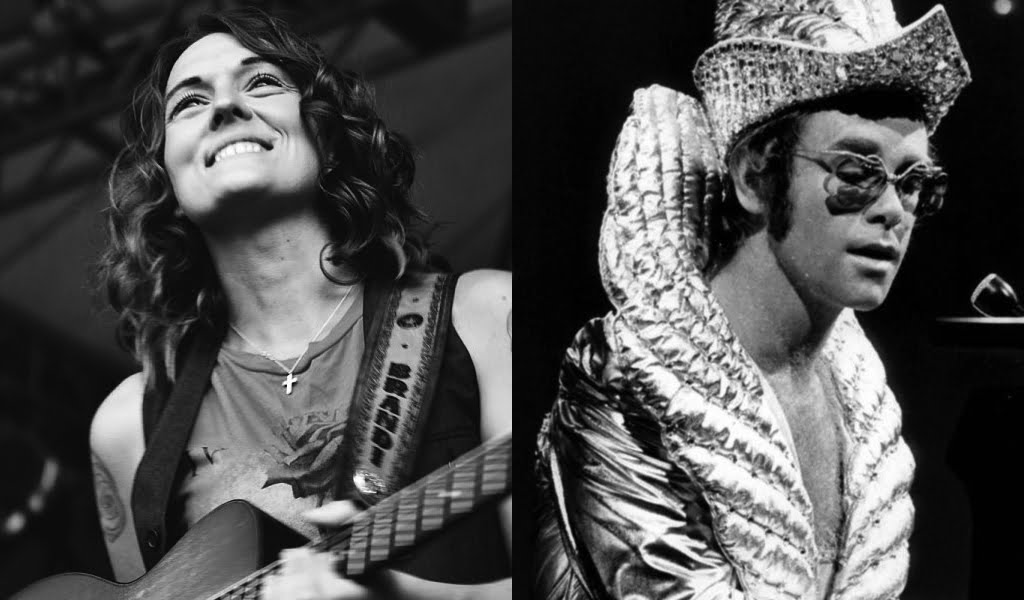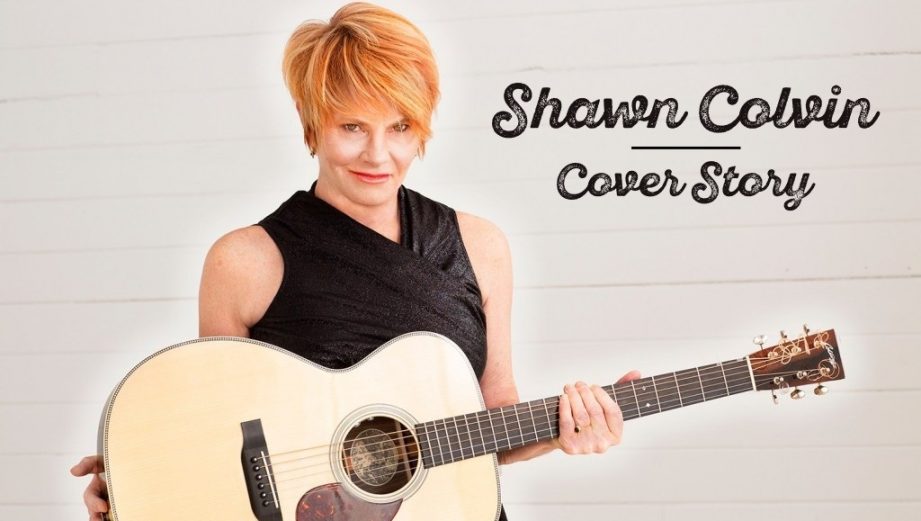The classically trained Sir Elton John wasn’t always just so. In his early days, Reginald Dwight was so hooked on the American sounds of Elvis Presley, Ray Charles, Jim Reeves, Bill Haley, and Jerry Lee Lewis that the band he formed in 1962 was called Bluesology. Then, in 1967, John met lyricist Bernie Taupin and music history would soon be made. The pair continues writing together today, after more than 57 Top 40 hits (in the U.S.) on 30+ albums … and nearly as many awards.
“Border Song,” “Tiny Dancer,” “Crocodile Rock,” “Philadelphia Freedom,” and myriad other John/Taupin collaborations fill the soundtracks of so many lives … singer/songwriter Brandi Carlile‘s among them. She grew up idolizing the two British music men and, after combining their influence with a dash of Johnny Cash and a pinch of Patsy Cline, found her own rootsy sound evolving and emanating from that somewhat surprising foundation.
To connect the dots between Sir Elton and American roots music, you have to go back to his days as Reggie Dwight. Draw that line for us.
I feel like sometimes an artist’s separation from their influences by proximity and culture almost intensify and exaggerate the effect that a certain genre has on them. Examples of this that come to mind are Paul McCartney’s passion for Buddy Holly and American rock ‘n’ roll; Old Crow Medicine Show cutting their teeth in Ithaca, NY, only to become incredible live Appalachian bluegrass on steroids — complete with Ketch Secor’s almost savant encyclopedia of knowledge on the genre and his preoccupation with southern culture; British, bluegrass-influenced arena band Mumford and Sons and Colorado-based Lumineers are also good examples of this … not to mention my personal obsession with country music and the South as a northerner or, as an American, my obsession with Brit Pop — Freddie Mercury, the Beatles … but, above all these, Elton John. Admiration from a distance is the strongest kind.
While Elton, by definition, is decidedly British, he has pushed the envelope on genre so far that it’s completely inapplicable to him. He was deeply influenced by American rock ‘n’ roll and roots music. Being so far away from Little Richard, Chuck Berry, Jerry Lee Lewis, and Elvis Presley only seems to have fueled the obsession with the culture of early American rock ‘n’ roll roots music for him.
Elton once said that Elvis looked like an alien to him. My great uncle Sunny, a guitar player and singer, told me that he was too busy (along with his friends) being jealous of Elvis Presley to be influenced by him at the time. The space between an artist and the music that inspires them becomes purer as it grows, erasing lines of competition, jealousy, even racism and politics. Elton John is a lover of early American rock ‘n’ roll roots music, pure as the driven snow. He could probably teach you and me a thing or two about it!
The most defining influences from early to current Elton John are his deep love for Leon Russell and Buffy Sainte-Marie. It took an eccentric British man in his 60s to teach me about these two absolute pillars in American folk/roots and to see something fundamental that was right in front of my nose whole time.
Once he teamed up with Bernie Taupin, things shifted. What threads of honky tonk, gospel, and other roots do you hear in their early work?
When Elton John started writing with Bernie Taupin, it was like rock ‘n’ roll met roots — Captain Fantastic meets the Brown Dirt Cowboy — and now you don’t only have early American overtones, musically, but they’re touching lyrically on early American themes. The entire Tumbleweed Connection record is Civil War fantasy meets early American Western. Good guys and bad guys, riverboats, Yankees and the Union, sons of their fathers, New Orleans, and “good old country comfort in my bones.”
Early American gospel makes its way onto Elton John many times, most notably in “Border Song” complete with a nod to ending racism. These themes are a constant throughout their career and continue to be. “Texan Love Song,” to Roy Rogers, all the way to the T Bone Burnett records of today, The Union and The Diving Board.
Bernie Taupin, to me, is the best lyricist there is and certainly the most fantastical and unselfish in his work. He is deeply interpretative and, honestly, self-revealing while also introducing us to fantasy and objectivity unchanged for 40 years.

Elton John with Bernie Taupin (left) in 1971. Photo credit: Public domain.
You have a thing for big personalities in your musical heroes … Elton, Elvis, Freddie Mercury, Johnny Cash. So you clearly don’t think Elton’s flamboyant, costumed persona took anything away from his respectability as an artist. Correct?
No! No way! Elton John’s eccentricity is authentic. Picture Elton John in the hipster attire of his time — skinny jeans and a beard, all browns and fedoras with a tiny tie. Who’s going to believe anything a guy has to say about “Bennie and the Jets” in that? He proved that he could make you cry dressed like Donald Duck. That means everything. Little Jimmy Dickens and Minnie Pearl probably loved him.
There aren’t many artists who could do a duets album that included Tammy Wynette, Leonard Cohen, and RuPaul. So what is it about Elton and his music that create such a wide berth?
The thing about Elton John that creates a wide berth is that he is a truly authentic person who thrives on enthusiasm and loving people! In fact, he loves so many different kinds of people that he regularly offends someone over his acceptance of someone else. Dolly Parton also has this rare gift. Elton tends to embrace the unacceptable — from collaborating with Eminem when he was in such hot water, to playing at Rush Limbaugh’s birthday party, to insinuating that Jesus might be gay, to now getting on the phone with Vladimir Putin on behalf of LGBT Russian citizens. As a result, when Elton john speaks out against something, everyone listens … I certainly do.
Elton is wildly diverse in his efforts to become a bridge builder. He’s very intriguing and his musical collaborations have been very reflective of that. I used to listen to Duets, his collaborative duets record from the ’90s, and I never got tired of it because even if I was over [Don] Henley that day, I could hear him sing with Tammy.
Which album can we point to as the one where he moved completely away from his early influences? Or is there an argument to be made that they are still there, even in “Circle of Life”?
The beauty of Elton and Bernie is that there are no absolutes that can be applied to any one of their albums. They are a wild ride of genre twists and turns, career long. Say what you will about musical consistency, none of these records are background music. You don’t want to have them playing while you’re hosting a dinner party.
If I had to point to a departure from roots music — although never completely — I’d say maybe some of the mid-80s to early-90s stuff. From Leather Jackets, Breaking Hearts, maybe Too Low For Zero, or The Big Picture. However, having said that, those records made a huge impact on me and, last time I checked, I’m still a roots artist. Elton’s Americana leanings are firmly in tact. His last two records with T Bone Burnett are truly some of the best of his career. The Union with Leon Russell is a favorite of mine and The Diving Board is a return to form in a way that feels to me like hearing Johnny Cash sing alone on American Recordings.
Elton and Bernie have deeply influenced me as an American roots artist from 5,000 miles away! Thanks for giving me the chance to say so.
Brandi Carlile photo courtesy of Brandi Carlile. Elton John photo credit: Heinrich Klaffs / Foter / CC BY-NC-SA.



